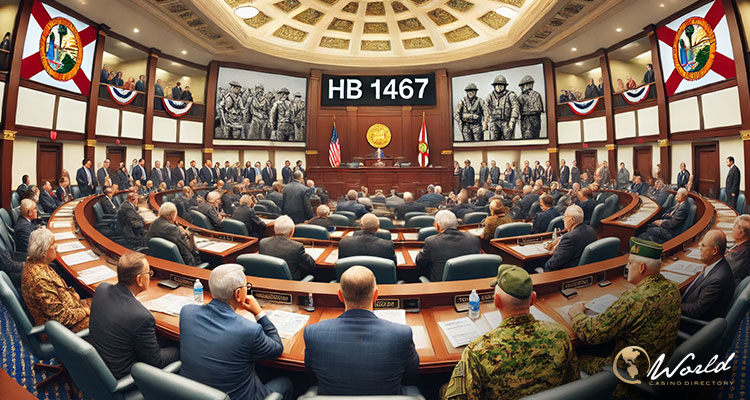Florida’s proposed gambling reform legislation, House Bill 1467, continues to make headway in the state legislature, despite drawing sharp criticism from veterans’ organizations, horse racing advocates, and representatives of the amusement industry. The bill, spearheaded by Republican lawmakers Rep. John Snyder and Rep. Adam Anderson, seeks to overhaul existing gambling regulations by increasing penalties for illegal operations, introducing new restrictions on former regulators, and folding in controversial provisions around racetrack decoupling.
One of the bill’s core objectives is to empower state law enforcement and the Florida Gaming Control Commission (FGCC) with stronger tools to combat unlawful gaming businesses. If enacted, HB 1467 would escalate penalties for operating illicit gambling houses, transforming what is currently a misdemeanor offense into a third-degree felony for a first-time violation. Repeat offenders—whether operators or employees—would face even harsher consequences under the bill’s graduated penalty structure.
The legislation also targets integrity concerns in sports betting. It proposes criminal penalties for individuals using insider information to wager on sports or fantasy sports competitions. While the bill explicitly prohibits insider betting, it exempts activities such as offering gaming tips for less familiar games like fish tables, deeming such actions educational rather than exploitative.
In introducing the bill to the House Industries and Professional Activities Subcommittee earlier this month, Snyder emphasized that the reforms are not aimed at expanding legal gambling but at codifying provisions from Florida’s gaming compact with the federally recognized Seminole Tribe into statute. His proposal has already passed through the Budget Committee and the initial subcommittee and is currently under Commerce Committee review.
Veterans and Amusement Groups Question Legislative Clarity
Despite progress, HB 1467 has not been without vocal opposition. The Amusement Machine Association of Florida, which represents numerous establishments including those run by veterans’ groups, expressed concern over the bill’s language during a recent committee hearing. Their spokesperson, Jonathan Zachem, warned that the bill’s current wording is vague and could inadvertently criminalize lawful gaming activities in veterans’ halls, stating, “It states that if you have a ‘prohibited or not prohibited game,’ you’re guilty of keeping a gambling house.”
Veterans of Foreign Wars (VFW) and the Florida American Legion also weighed in, cautioning that unclear definitions in the bill might jeopardize legal recreational activities like bingo. Bill Helmich, speaking for both groups, described the legislation’s phrasing as “clear as mud,” according to the Boca Raton Tribune.
Rep. Yvonne Hinson echoed these concerns, refusing to support the bill without further clarification, especially regarding its potential effects on veterans’ organizations. Snyder, a veteran himself, acknowledged the feedback and committed to refining the language to address these issues before the bill is brought to the House floor.
Controversial Decoupling Provision Sparks Industry Backlash
Fueling further debate is the inclusion of the divisive “decoupling” measure, which would allow racetracks such as Gulfstream Park and Tampa Bay Downs to operate slot machines and card rooms independently of live racing. The Stronach Group, the Canadian-based parent company of Gulfstream Park, has been a major proponent of the initiative.
The decoupling element was originally part of a separate bill but was merged into HB 1467 after the Florida Senate Appropriations Committee tabled its companion legislation, SB 408. This strategic maneuver has drawn sharp criticism from the Thoroughbred racing industry, which sees it as a potential death knell for Florida’s horse racing legacy.
“There’s somewhere around $30 million annually that goes into the Thoroughbred industry… That’s not changing,” said Rep. Anderson, arguing the amendment would make funding distribution more efficient and beneficial for breeders and owners. However, stakeholders remain skeptical.
Mandy Pope of Whisper Hill Farm accused lawmakers of prioritizing foreign interests over local communities. “The decoupling bill benefits a Canadian gaming conglomerate, not Florida families,” she said. Jena Antonucci, trainer of the 2023 Belmont Stakes winner, criticized the speed of the legislation, asking, “Why are we rushing a $3 billion industry through legislation?”
Even with language requiring that Gulfstream Park continue racing through at least July 1, 2030, opponents insist the change threatens the long-term viability of Florida’s horse racing ecosystem. Lonny Powell, CEO of the Florida Thoroughbred Breeders’ and Owners’ Association, called the House version “an assault on our industry,” and urged lawmakers to “reject decoupling” to preserve rural jobs and investment.
What’s Next?
With the legislative session concluding on May 2, time is running short for changes. HB 1467 has cleared key committees in the House, while its Senate companion, SB 1404, is advancing more cautiously and currently lacks the decoupling provision. If passed, HB 1467 would also enforce a two-year ban on employment or investment in the gaming industry by former FGCC employees.
As lawmakers continue to deliberate, the bill’s fate—and its potential implications for gaming, veterans, and racing—remains uncertain. For now, advocates on both sides are gearing up for a final push as the bill approaches a vote on the House floor.



